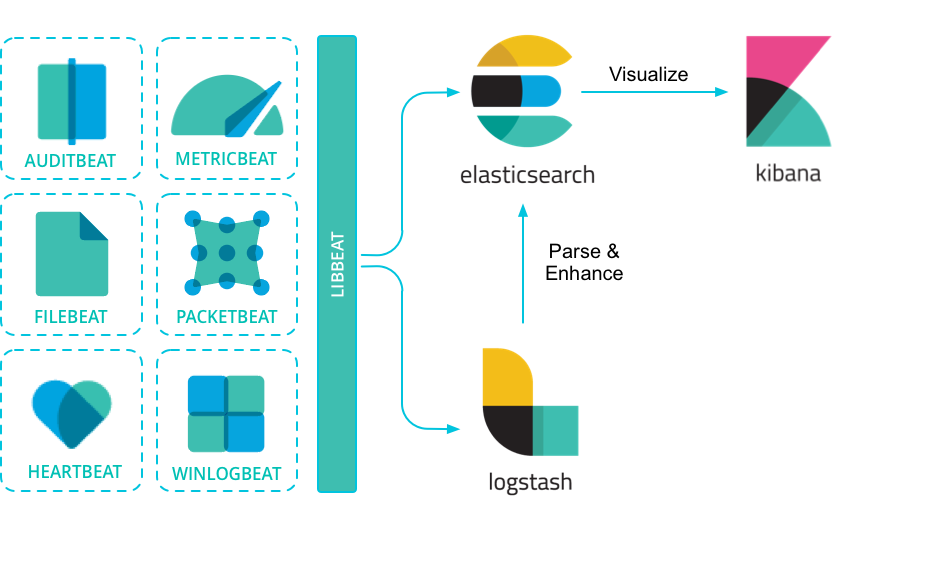ELK Stack with Nestjs
 tkssharma
tkssharma
Elasticsearch is a highly scalable, distributed search engine that forms the core of the ELK Stack (Elasticsearch, Logstash, Kibana). It is responsible for storing, indexing, and searching log data.
Here's a breakdown of its role:
Data Storage: Elasticsearch stores log data in a highly scalable and distributed manner, allowing it to handle large volumes of data.
Indexing: Elasticsearch indexes the log data, creating an inverted index that enables efficient search.
Search: Elasticsearch provides powerful search capabilities, allowing you to query and analyze your log data using a variety of search criteria.
Analytics: Elasticsearch can be used for advanced analytics tasks, such as time-based analysis, trend detection, and anomaly detection.
Integration with Kibana: Elasticsearch is tightly integrated with Kibana, providing a seamless way to visualize and explore your log data.
Key Benefits of Elasticsearch:
Scalability: Elasticsearch can handle large volumes of data and can be easily scaled horizontally.
Speed: Elasticsearch is highly performant and can handle complex search queries efficiently.
Flexibility: Elasticsearch supports a wide range of data types and can be used for a variety of use cases.
Integration with ELK Stack: Elasticsearch is a core component of the ELK Stack, providing a powerful foundation for log management and analysis.
In summary, Elasticsearch is a powerful and scalable search engine that plays a crucial role in the ELK Stack. It provides the foundation for storing, indexing, and searching log data, enabling effective analysis and visualization.
Logstash is a central component of the ELK Stack (Elasticsearch, Logstash, Kibana) responsible for processing and enriching logs before they are sent to Elasticsearch for storage and analysis.
Here's a breakdown of its role:
Data Ingestion: Logstash can ingest logs from various sources, including files, syslog, and network sockets.
Data Processing: Logstash can transform and filter log data using plugins and filters. This includes tasks like:
Parsing log messages into structured fields.
Adding or removing fields.
Applying geo-location or other enrichments.
Filtering logs based on specific criteria.
Data Enrichment: Logstash can enrich log data with additional information, such as IP addresses, hostnames, or user identities.
Data Shipping: Logstash sends the processed log data to Elasticsearch for storage and analysis.
Key Benefits of Logstash:
Flexibility: Logstash can handle a wide variety of log formats and sources.
Processing Power: It provides powerful data processing capabilities, allowing you to transform and filter logs as needed.
Integration with ELK Stack: Logstash is tightly integrated with Elasticsearch and Kibana, providing a seamless workflow for log management and analysis.
Scalability: Logstash can be scaled horizontally to handle large volumes of logs.
In summary, Logstash plays a crucial role in the ELK Stack by processing and enriching log data before it is stored in Elasticsearch. This allows for more efficient and effective analysis of log data using Kibana.
Kibana is a powerful visualization and analysis tool that is part of the ELK Stack (Elasticsearch, Logstash, Kibana). It provides a user-friendly interface for exploring, searching, and visualizing data stored in Elasticsearch.
Here's a breakdown of its role:
Data Visualization: Kibana allows you to create custom dashboards and visualizations to visualize your log data in a meaningful way.
Search and Discovery: Kibana provides advanced search capabilities to query and analyze your log data.
Time-Based Analysis: You can analyze your logs over time to identify trends, anomalies, and patterns.
Alerting: Kibana can be configured to trigger alerts based on specific conditions, such as when certain error messages appear or performance metrics exceed thresholds.
Integration with Other Tools: Kibana can be integrated with other tools in the ELK Stack, as well as external applications, to provide a comprehensive analytics solution.
Key Benefits of Kibana:
User-Friendly Interface: Kibana provides an intuitive interface that is easy to learn and use.
Powerful Visualization Capabilities: Create a variety of visualizations, including charts, graphs, and maps.
Advanced Search: Kibana offers advanced search features to help you find the information you need.
Integration with Elasticsearch: Kibana is tightly integrated with Elasticsearch, providing seamless access to your log data.
In summary, Kibana is a vital component of the ELK Stack, providing a powerful and flexible tool for visualizing and analyzing your log data.
Filebeat is a lightweight agent that is part of the ELK Stack (Elasticsearch, Logstash, Kibana). It's primarily responsible for shipping logs from various sources to Logstash for centralized processing.
Here's a breakdown of its role:
File Monitoring: Filebeat watches specific files or directories for changes.
Log Collection: When new log lines appear, Filebeat reads them and prepares them for shipment.
Data Enrichment: Filebeat can add context or metadata to the logs before sending them to Logstash.
Shipment to Logstash: Filebeat forwards the collected logs to Logstash for further processing.
Key Benefits of Filebeat:
Lightweight and Efficient: Filebeat has a minimal footprint and is designed for efficient log collection.
Flexible: It can handle various log formats and sources.
Scalable: Filebeat can be easily scaled to handle large volumes of logs.
Integration with ELK Stack: It seamlessly integrates with Logstash and Elasticsearch for centralized logging and analysis.
In summary, Filebeat plays a crucial role in the ELK Stack by efficiently collecting logs from various sources and forwarding them to Logstash for further processing.
Subscribe to my newsletter
Read articles from tkssharma directly inside your inbox. Subscribe to the newsletter, and don't miss out.
Written by

tkssharma
tkssharma
I'm a full-stack software developer creating open-source projects and writing about modern JavaScript client-side and server-side. Working remotely from India.